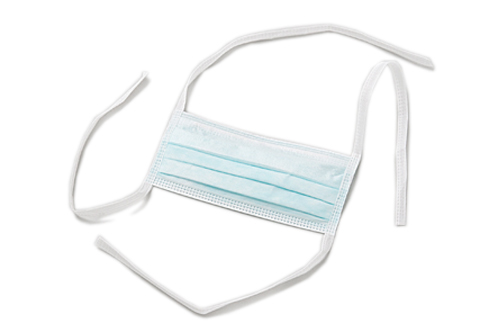Following feedback from staff on fit testing for FFP3 face masks, the infection, prevention and control (IPC) team would like to clarify when you should use which mask and what protection each mask will give you.
What are FFP3 masks?
Filtering face piece level 3 (FFP3) masks are high efficiency filter masks which, if fitted correctly, filter out 98% of particles including dust, fibres and micro-organisms. Both the re-usable and disposable masks meet FFP3 standards and will offer you the required protection.
![]()
FFP3 respirator - reusable
![]()
FFP3 mask- disposable
FFP3 classified items are approved for use against solid and liquid aerosols. They are suitable for protection against high toxicity harmful materials in concentrations up to fifty times occupational exposure levels.
What are surgical masks?
Surgical masks are paper masks without a filter and only provide protection against sputum/ fluid droplets. They do not offer any protection against aerosolised droplets or infectious disease spread via the airborne route.

Surgical face mask
![]()
Surgical mask & face shield
![]()
Face shield
When are FFP3 masks required?
FFP3 masks are required as part of IPC precautions to protect staff and reduce the risk of airborne/ droplet spread of infectious organisms from infectious respiratory virus, for example pulmonary TB, pandemic or avian flu, MERS-CoV, SARS.
They should be worn when performing aerosol-generating procedures (e.g. suction, intubation) on patients known/ suspected of having an infection which is spread via the airborne or micro-droplet route; or, when caring for patients who are known/ suspected of having a new emerging infectious disease.
As well as IPC issues, FFP3 masks/respirators should be worn when there is any broken asbestos, in dusty environments such as wood mills and bakeries or where the owner of the premises has indicated that the area is a PPE area.
When are surgical masks required?
Surgical face masks are required as part of IPC precautions to protect staff and reduce the risk of bodily fluid splashes to the mucous membranes of the mouth. They are often used in conjunction with a face shield which protects the remainder of the face and eyes. Face shields are required when splashing to the face from blood or bodily fluids is anticipated.
What is “fit testing”?
Facial fit testing is a method of checking that the mask matches the user’s features and seals adequately to their face. A fit test should be used as part of the initial selection of the respiratory protective equipment (RPE). Remember that tight-fitting RPE will only provide effective protection if the wearer is clean shaven, so they should also be clean shaven when fit tested. There may be occasions where for medical or religious reasons that shaving is not permitted so alternative RPE should be sought.
Fit testing also serve as a useful training tool for teaching the user how to put on their mask correctly. Correct fitting of the mask at all times is vital to prevent exposure.
Fit testing should be refreshed every two years or if the wearer loses or gains weight, undergoes any substantial dental work or develops any facial changes (scars, moles etc.) around the face seal area.
How is “fit testing” performed?
The wearer is fitted with a mask by a manager who has been trained in how to undertake a fit test. A sweet or bitter tasting aerosol or odour compound is then passed around the seal and the wearer is then asked to say if they have smelt anything and describe what they can smell.
Who needs to be “fit tested”?
All operational staff should be fit tested for an FFP3 mask and have access to the appropriate mask type/ size that they have been tested for.
What if I fail the “fit testing”?
There isn’t one mask which will fit everybody, so some people will need to be offered an alternative mask type or size. The Trust has stocks of alternative masks and these will be offered to staff who cannot be sufficiently protected from the primary mask offered.
There may also be a cause for the failure, e.g. facial hair, so it is advised that staff are clean shaven for fit testing as facial hair can result in a poor seal.
Published 28th June 2015